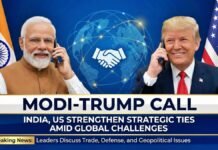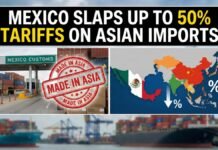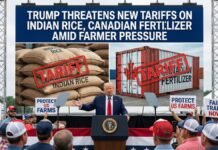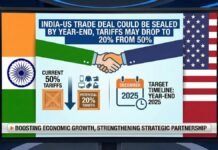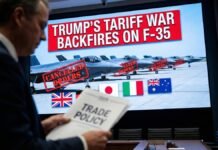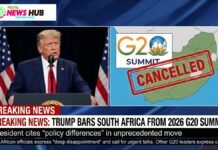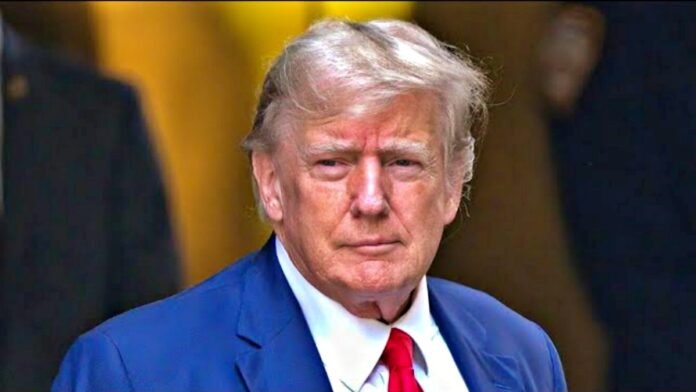
Key Highlights:
- Tariff Postponed: President Donald Trump has delayed imposing a 25% tariff on Canadian imports for 30 days after discussions with Canadian Prime Minister Justin Trudeau.
- Mexico Tariff Suspended: A similar 25% tariff on Mexican imports has also been postponed for one month, following Mexico’s promise to strengthen border security.
- National Guard Deployment: Mexico will deploy 10,000 National Guards along its border to curb illegal immigration and drug trafficking.
Washington D.C.: In a surprising move, U.S. President Donald Trump has decided to delay the imposition of a 25% tariff on Canadian imports for 30 days. This decision came after a phone call with Canadian Prime Minister Justin Trudeau, who confirmed that Ottawa had agreed to cooperate more closely on U.S. border security concerns.
The tariff, announced just a day earlier, had raised fears of a trade war between the two neighboring countries. However, Trudeau assured that Canada would enhance its efforts to address border issues, leading Trump to temporarily halt the tariff.
Mexico Avoids Immediate Tariff with Border Security Promises
Similarly, Mexican President Claudia Sheinbaum announced that Trump has agreed to suspend the planned 25% tariff on Mexican imports for one month. This agreement followed Mexico’s commitment to deploy 10,000 National Guards along its border to combat illegal immigration and drug smuggling into the United States.
Sheinbaum emphasized Mexico’s willingness to cooperate with the U.S., stating, “We are taking immediate action to address concerns raised by President Trump.”
Trump’s Tariff Strategy: A Broader Context
President Trump initially announced tariffs of 25% on imports from Canada and Mexico, as well as a 10% tariff on Chinese goods, citing national security concerns. The tariffs were set to take effect at midnight on Tuesday and were aimed at pressuring these nations to address issues related to illegal immigration and drug trafficking.
However, both Canada and Mexico had threatened retaliatory measures, escalating tensions and raising the specter of a trade war. The temporary suspension of tariffs reflects ongoing negotiations between the U.S. and its key trading partners.
Canada’s Response: Cooperation Over Conflict
Canadian Prime Minister Justin Trudeau expressed relief over the temporary halt in tariffs, emphasizing Canada’s commitment to resolving disputes diplomatically. He stated that Ottawa would work closely with Washington to enhance border security measures while maintaining strong trade relations.
Trudeau remarked, “We are committed to ensuring the safety of our borders while fostering economic stability between our two nations.”
Mexico’s Border Security Measures
To avoid the tariffs, Mexico has pledged significant action:
- Deployment of 10,000 National Guards along its border with the U.S.
- Increased efforts to prevent drug smuggling and illegal immigration into American territory.
President Sheinbaum confirmed that talks with Trump would continue but noted that no formal meeting had been scheduled yet. She emphasized Mexico’s focus on maintaining strong diplomatic ties while addressing U.S. concerns.
Trump Confirms Temporary Agreements
President Trump acknowledged both agreements with Canada and Mexico during a press briefing, stating that the tariffs have been temporarily halted as both nations have shown a willingness to cooperate. However, he warned that if progress is not made within the agreed timeframes, the tariffs could still take effect.
Trump commented, “We’ve made short-term agreements with Canada and Mexico. But let me be clear—if we don’t see real action on border security and illegal trade practices, these tariffs will be back on the table.”
Impact on Trade Relations
The temporary suspension of tariffs provides a brief reprieve for businesses and consumers in all three countries:
- Avoiding immediate price hikes on goods imported from Canada and Mexico.
- Maintaining smoother trade flows across North America while negotiations continue.
- Easing tensions in an already fragile global trade environment.
However, uncertainty remains as the agreements are short-term solutions rather than long-term resolutions.
A Fragile Truce
The temporary halting of tariffs highlights the delicate balance in U.S.-Canada-Mexico relations under Trump’s administration. While both Canada and Mexico have taken steps to address U.S. concerns, the looming threat of tariffs continues to cast a shadow over North American trade dynamics.
As talks progress over the next month, all eyes will be on whether these nations can reach lasting agreements or if tensions will escalate once again when the deadlines expire. For now, this fragile truce offers some breathing room for diplomacy to take center stage.


































